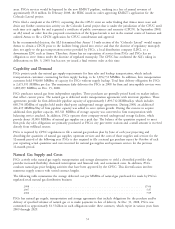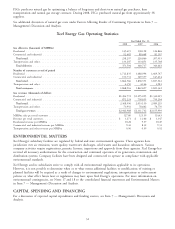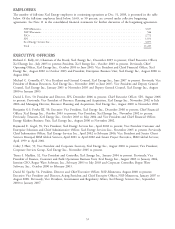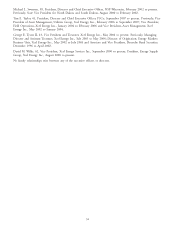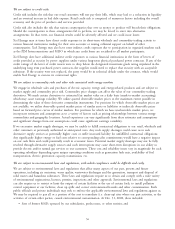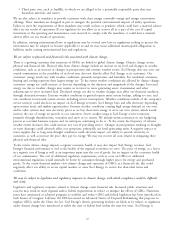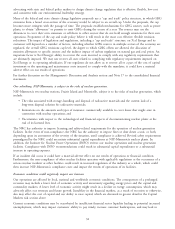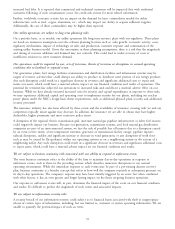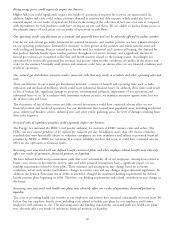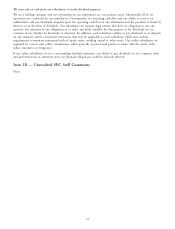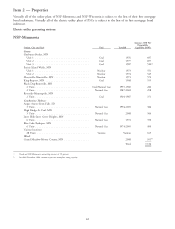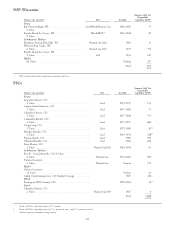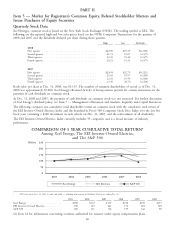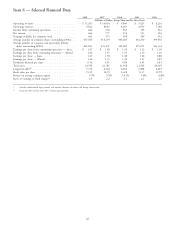Xcel Energy 2008 Annual Report Download - page 50
Download and view the complete annual report
Please find page 50 of the 2008 Xcel Energy annual report below. You can navigate through the pages in the report by either clicking on the pages listed below, or by using the keyword search tool below to find specific information within the annual report.Rising energy prices could negatively impact our business.
Higher fuel costs could significantly impact our results of operations if requests for recovery are unsuccessful. In
addition, higher fuel costs could reduce customer demand or increase bad debt expense, which could also have a
material impact on our results of operations. Delays in the timing of the collection of fuel cost recoveries as compared
with expenditures for fuel purchases could have an impact on our cash flows. We are unable to predict future prices or
the ultimate impact of such prices on our results of operations or cash flows.
Our operating results may fluctuate on a seasonal and quarterly basis and can be adversely affected by milder weather.
Our electric and natural gas utility businesses are seasonal businesses, and weather patterns can have a material impact
on our operating performance. Demand for electricity is often greater in the summer and winter months associated
with cooling and heating. Because natural gas is heavily used for residential and commercial heating, the demand for
this product depends heavily upon weather patterns throughout our service territory, and a significant amount of
natural gas revenues are recognized in the first and fourth quarters related to the heating season. Accordingly, our
operations have historically generated less revenues and income when weather conditions are milder in the winter and
cooler in the summer. Unusually mild winters and summers could have an adverse effect on our financial condition and
results of operations.
Our natural gas distribution activities involve numerous risks that may result in accidents and other operating risks and
costs.
There are inherent, in our natural gas distribution activities, a variety of hazards and operating risks, such as leaks,
explosions and mechanical problems, which could cause substantial financial losses. In addition, these risks could result
in loss of human life, significant damage to property, environmental pollution, impairment of our operations and
substantial losses to us. In accordance with customary industry practice, we maintain insurance against some, but not
all, of these risks and losses.
The occurrence of any of these events not fully covered by insurance could have a material adverse effect on our
financial position and results of operations. For our distribution lines located near populated areas, including residential
areas, commercial business centers, industrial sites and other public gathering areas, the level of damages resulting from
these risks is greater.
Increased risks of regulatory penalties could negatively impact our business.
The Energy Act increased the FERC’s civil penalty authority for violation of FERC statutes, rules and orders. The
FERC can now impose penalties of $1 million per violation per day. In addition, more than 120 electric reliability
standards that were historically subject to voluntary compliance are now mandatory and subject to potential financial
penalties by NERC or FERC for violations. If a serious reliability incident did occur, it could have a material adverse
effect on our operations or financial results.
Increasing costs associated with our defined benefit retirement plans and other employee-related benefits may adversely
affect our results of operations, financial position, or liquidity.
We have defined benefit and postretirement plans that cover substantially all of our employees. Assumptions related to
future costs, return on investments, interest rates and other actuarial assumptions have a significant impact on our
funding requirements related to these plans. These estimates and assumptions may change based on economic
conditions, actual stock market performance, changes in interest rates and any changes in governmental regulations. In
addition, the Pension Protection Act of 2006, as amended, changed the minimum funding requirements for defined
benefit pension plans beginning in 2008. Therefore, our funding requirements and related contributions may change in
the future.
Increasing costs associated with health care plans may adversely affect our results of operations, financial position or
liquidity.
The costs of providing health care benefits to our employees and retirees have increased substantially in recent years. We
believe that our employee benefit costs, including costs related to health care plans for our employees and former
employees, will continue to rise. The increasing costs and funding requirements associated with our health care plans
may adversely affect our results of operations, financial position, or liquidity.
40



